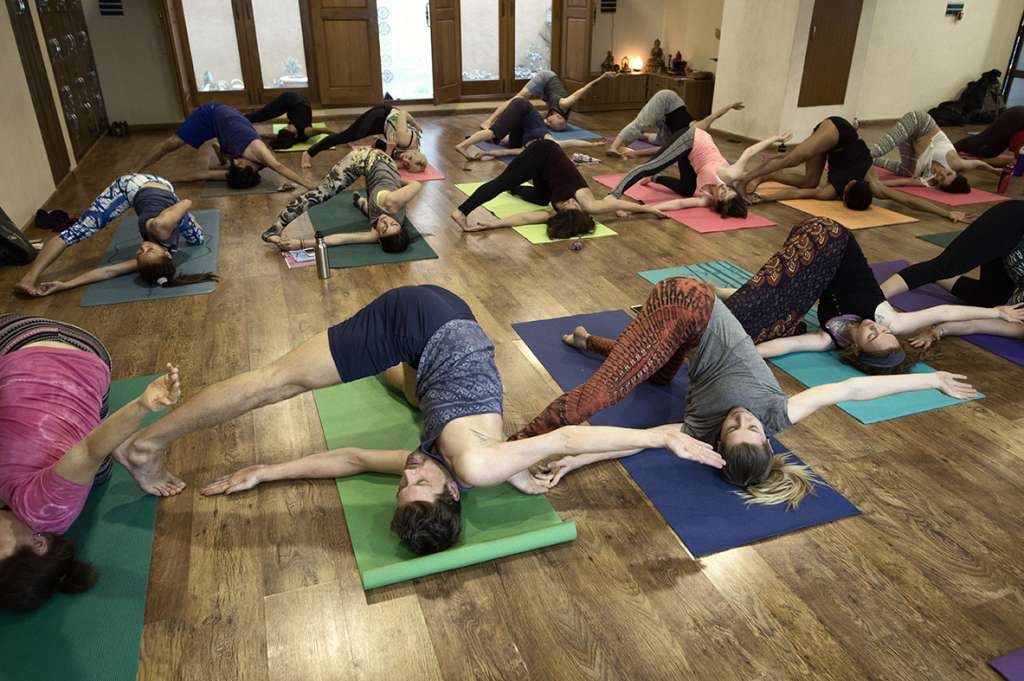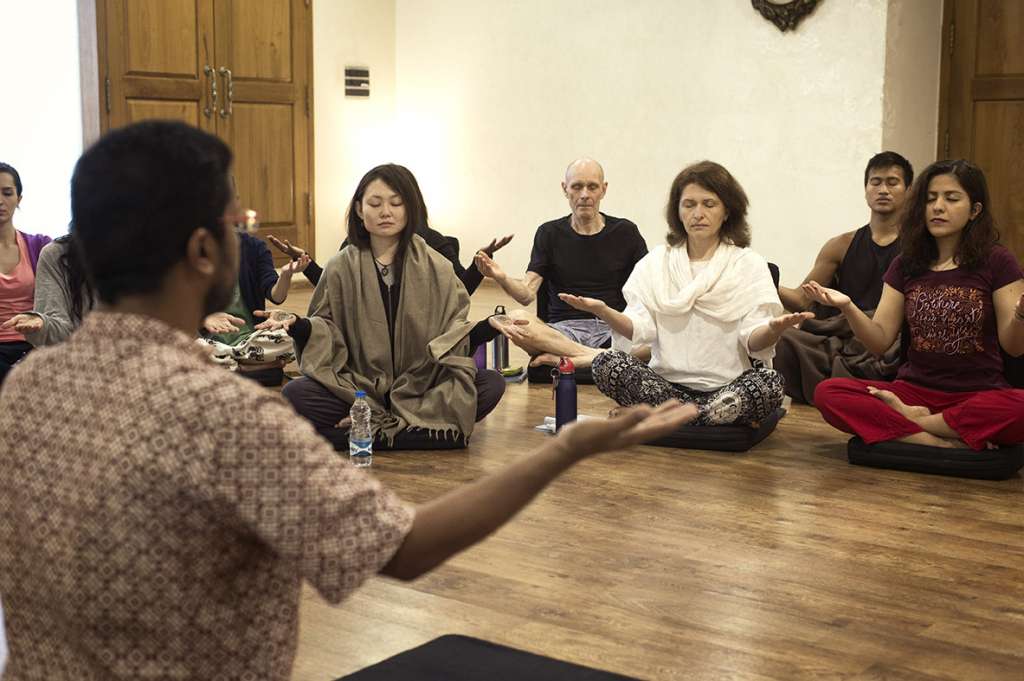200H Hatha Yoga Teachers Training Course
Specially designed program to enable our trainees get deeper into the Hatha Yoga series, improve their own personal practice and gain indispensable experience of a lifetime.
One month teacher training course which includes the following subjects
- Yoga Asana Practice level 1 and 2
- Pranayama (Yogic breathing practice)
- Anatomy and Physiology for Yoga
- Philosophy of Pathajali Yoga Sutras (Chapter 1 and 2)
- Ayurveda
- Teaching Methodology
- Meditation (Active and Passive)
- Ethics of Yoga
- Business, marketing and ethics of yoga
 Course Objective
Course Objective
Daily yoga practice and attendance to every lesson is obligatory during the whole training.
After completion of the hatha yoga teacher training course the trainers will be able to have regular self-practice, will have the confidence and knowledge how to teach hatha yoga and lead a class of specially designed asana sequence according to the needs of their own students in the future.
We teach our trainees how to use yoga accessories (belt, bricks, bolsters) in order to make asana practice approachable to any physical constitution and capabilities, avoiding the risk of injury during the practice.
Daily meditation and pranayama practice will prepare the trainees to lead meditation sessions and pranayama techniques. Applied anatomy for yoga will help them understand articulation of each body part in every asana.
Asana practice Level 1 & 2 and Teaching methodology (100 Hours )
6am to 8am & 3pm to 5pm
First and second week Level 1:
Morning led classes focus on basic stretches, Surya namaskar A ( Sun salutations ), total 45 individual asanas will be covered including standing poses, sitting poses, supine poses , prone poses and finishing sequence .
On the second week the focus is aimed on self-practice alignments and adjustments from faculties and trainee’s.
The afternoon classes are intended for mastering individual poses, learning how to practice correctly, study alignment and hand on adjustments, getting to know how to use yoga accessories such as belts, bricks and bolsters. All of this will strengthen their capability in leading led classes.
Third and Fourth week Level 2:
Morning led classes focus on Advance stretches, Surya Namaskar B, total 40 advance individual asanas will be covered including advance standing, sitting, supine, prone asanas and finishing sequences.
By the end of the third week trainees should be able to lead the led class and will be ready to give hands on adjustments and alignment. Fourth week is reserved for practical exam evaluated by faculties of Nirvana Yoga Shala.
Yogic breathing practice (Pranayama 24 Hours ) 8am to 9am
Pranayama is a Sanskrit term which means regulation of breath, which is conducted through various yogic techniques and exercises with conscious awareness of the breathing. The word itself describes the meaning of the practice – Prana which means breath, vital energy within the body and yama which means regulate, control, restrain. Having regular practice you will be able to consciously control your non-physical subtle energy, achieving healthy body mind relationship.
First and Second week:
During these lessons we will practice and learn how to teach the following breathing techniques: Kapalabhati, Bastrika, Ujjai, Nadi shodana, Surya bhedana, Chendra bedana, Anuloma-Viloma, Shithali, Shitkari and Bramari.
Third and Fourth week:
As the course develops, the trainees will be introduced into more advance variations of first and second week practice, with the addition of Bandhas and Mudra techniques for a complete pranayama expereince
Fourth week
By the end of the teacher training course the trainees will be capable to lead the class. Practical exam will be conducted, with the evaluation of the Nirvana Yoga School faculties.
Anatomy and physiology for Yoga (20 Hours) 11.30am to 1.30pm
Being a yoga teacher comes with the responsibility of your student’s wellbeing. You should be able to help them improve their body posture, decrease the amount of specific disorders and body curvatures and recognize which asanas would be helpful for which student according to their needs and capabilities. Our trainees are taught with the help of multimedia presentations, hands on anatomy, case studies of injuries. This approach will help them understand why difficulties with certain movements can occur and how to overcome them. Besides the basics of muscular skeletal anatomy, we will cover the joint mechanics, understand where movement comes from, the nature of body tissues and how they are affected though the asanas.
 Meditation (24 Hours) 5.30pm to 6.30pm
Meditation (24 Hours) 5.30pm to 6.30pm
Our meditation lessons at the end of each day during the teacher training course help our trainees get into a state of centering, relaxation and contemplation. Living in a fast paced society, always conditioned to compete and react to the external stimulation, we rarely have the time to reconcile with our true being, or the knowledge how to do it.
We teach our trainee’s techniques which help them release accumulated stress in our body-mind, let go of any physical, mental tension, creating situation in which passivity happens.
We practice and study specially designed Active meditations which were created by Osho for the modern man.
Philosophy of Yoga – Patanjali Yoga Sutras (Aphorisms) 20 hours 11am to 1pm
Knowing the postures, how to perform them and being a good practitioner doesn’t make one a good yoga teacher. Knowledge of the ancient yoga scripts and their application in everyday life is essential for your growth and maturity as a yoga teacher, who would be capable of shifting the limiting beliefs, conditioning and barriers in yours and your student’s minds. Yoga is not as the modern day is constantly presenting. Yoga is an internal practice, constant self-awareness of your action, thoughts and reactions to the outer stimulation as well as the inner conflicts, mental state and emotions. The intention is to change our conditioned reaction patterns and develop a habit of constant internal self-awareness, having enhanced understanding and better control over our personality.
Svadhyaya, the fourth niyama, as described in the Yoga Sutras of Patanjali, indicates on this self-study, self-observance, turning inward, recognizing and releasing tendencies that are not useful for our emotional, intellectual and spiritual growth.
Our Yoga Philosophy lessons will cover the Yoga Sutras of Patanjali, which are consisted of 196 sutras divided into four chapters: describing the outline according to which one can live a yogic life following a regular, dedicated practice. These scriptures are an authentic collection of aphorisms on yoga, providing the guidelines for purposeful and meaningful life for those interested in achieving inner tranquility and attaining spiritual self-realization.
During the course of our Hatha Yoga 200 hours teacher training, we will go through Chapters 1 & 2 in details.
Ayurvedic Diet
Our Yoga Teacher Training course has a holistic approach, offering comprehensive curriculum, preparing trainee’s to have thoroughly understanding and knowledge of the science of yoga. Ayurveda, the sister science of yoga and one of the oldest medicinal systems in history, emphasizes equilibrium between the body, mind and spirit in order to prevent and treat disease.
By understanding the Ayurveda principles, we have better understanding how to adjust lifestyle based on our personal Dosha type in correlation with the change of seasons in order to keep ourselves in balance, maintaining good overall health.

